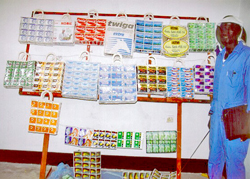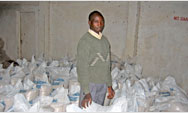You are here » Home » Telling Our Story
Success Story
Local officials commit to continuing environmental awards program
Sustaining Environmental Awareness

| |
Photo: Pancras Ngalason
|
|
An environmental award winner received a bicycle, which he used to collect waste like plastic bottles, phone cards, and tires to create products like the bags above to be sold for profit.
“The Coastal Environmental Awards Scheme is invaluable — something we cannot afford to lose. Through it people learn and practice sustainable development,” said Musa Dengo, an official from Tanga’s municipal natural resources bureau.
|
In Tanzania, a country brimming with natural wealth and beauty, environmental conservation education was not common in the 1990’s. Natural resources were being drained and coastal areas were becoming polluted. In 1999, USAID launched a five-year environmental education and awards initiative, known as the Coastal Environmental Awards Scheme. In just one year, it became a household name. Five years later, the project funding has ended, and district governments are transforming the awards scheme into a locally-run and financed activity.
The initiative mobilizes youth, women, and men to participate in environmental conservation through self-initiated projects. Examples include tree planting, beach clean-ups, seaweed cultivation, promoting fuel-efficient stoves, soil conservation, beekeeping, and recycling. These activities raise environmental awareness and often provide vital income to needy families. Projects are registered with local authorities and, if selected by an awards committee, receive public acclaim at the district’s World Environment Day celebration, a government-issued certificate, and a prize—such as a bicycle, hoe, boots, or cement—to help continue or expand their project.
The project began with just a few thousand participants in six coastal districts. In five years, it grew to over 400,000 participants in 20 districts by 2005. The idea has been so successful that, 12 district offices have incorporated the awards program into their annual Action Plans, thereby ensuring continued financial support and sustainability. The awards program has proven to be a successful way to motivate communities to safeguard the environment.
Faced with the program’s potential closure, participating districts refused to allow this valuable tool to expire. In Muheza district, authorities are extending the project to the entire district, while other southern coastal districts including Rufiji, Lindi, and Mtwara, are expanding activities to inland ecosystems. Schoolchildren, teachers, institutions, and individuals have won awards based on environmental creativity and ingenuity. Rain or shine, thousands of Tanzanians now strive daily to conserve and preserve the beautiful environment that surrounds them.
Print-friendly version of this page (422kb - PDF)
Click here for high-res photo
Back to Top ^ | 

